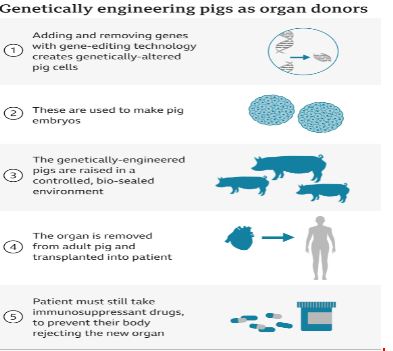

Context
A US man has become the world's first person to get a heart transplant from a genetically modified pig.
Background
- The case is of 57-year-old David Bennett, who doctors say was too ill to qualify for a human heart.
- After the surgery, he is doing well now.
- The surgery is being hailed by many as a medical breakthrough that could shorten transplant waiting times and change the lives of patients around the world.
- But some are questioning if the procedure can be ethically justified.
- They have pointed to potential moral trouble spots over patient safety, animal rights and religious concerns.
Analysis
How was it done?
- The heart used in the transplant came from a pig with several genetic modifications, including some to knock out genes that trigger the human immune system.
- Since the human immune system rejects anything that is foreign, whether from another person who is immunologically matched to the recipient or from a different species such as a pig, scientists had to tweak the pig genome to make the organ less likely to be rejected.
- Scientists altered 10 genes in the pig whose heart was used for Mr Bennett's transplant so it would not be rejected by his body.
- The pig had its heart removed on the morning of the operation.
|
The science behind gene modification
|
What are the ethical issues involved in experimental surgery?
The medical implications
- This is an experimental surgery, and brings with it huge risks for the patient.
- Even well-matched human donor organs can be rejected after they are transplanted - and with animal organs the danger is likely to be higher.
- Doctors have been trying to use animal organs for what is known as xenotransplantation for decades, with mixed success.
- In 1984, doctors in California tried to save a baby girl's life by giving her the heart of a baboon, but she died 21 days later.
- While such treatments are very, very risky, some medical ethicists say they should still go ahead if the patient knows the risks.
|
Why was Mr Bennett's case justified by the doctor?
|
Animal rights
- Mr Bennett's treatment has also re-sparked a debate over the use of pigs for human transplants, which many animal rights groups oppose.
- One of them, People for the Ethical Treatment of Animals (PETA) has condemned Mr Bennett's pig heart transplant as "unethical, dangerous, and a tremendous waste of resources".
- "Animals aren't tool-sheds to be raided but complex, intelligent beings," PETA said.
- It is wrong to modify the genes of animals to make them more like humans.
- Animals have a right to live their lives, without being genetically manipulated with all the pain and trauma this entails, only to be killed and their organs harvested.
- Some campaigners have concerns regarding the unknown long-term effects of genetic modification on the pig's health.
Religion
- Another quandary could emerge around those whose faiths might mean it is tricky for them to receive an animal organ.
- Pigs are chosen as the relevant organs are a similar size to humans' - and because pigs are relatively easy to breed and raise in captivity.
- But how does this choice affect Jewish or Muslim patients, whose religions have strict rules on the animal?
- Although Jewish law forbids Jews from raising or eating pigs, receiving a pig heart is "not in any way a violation of the Jewish dietary laws.”



